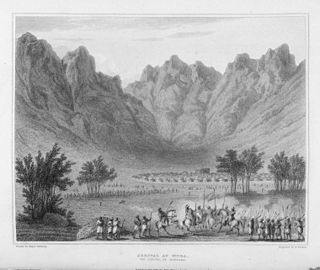
Cameroon, officially the Republic of Cameroon, is a country in west-central Africa. It is bordered by Nigeria to the west and north; Chad to the northeast; the Central African Republic to the east; and Equatorial Guinea, Gabon and the Republic of the Congo to the south. Its coastline lies on the Bight of Biafra, part of the Gulf of Guinea and the Atlantic Ocean. The country is sometimes identified as West African and other times as Central African, due to its strategic position at the crossroads between West and Central Africa. Its nearly 25 million people speak 250 native languages.
At the crossroads of West Africa and Central Africa, the territory of what is now Cameroon has seen human habitation since some time in the Middle Paleolithic, likely no later than 130,000 years ago. The earliest discovered archaeological evidence of humans dates from around 30,000 years ago at Shum Laka. The Bamenda highlands in western Cameroon near the border with Nigeria are the most likely origin for the Bantu peoples, whose language and culture came to dominate most of central and southern Africa between 1000 BCE and 1000 CE.
These are lists of incumbents, including heads of states or of subnational entities.
Duala is a dialect cluster spoken by the Duala and Mungo peoples of Cameroon. Douala belongs to the Bantu language family, in a subgroup called Sawabantu. It is a tonal language with subject–verb–object word order. Maho (2009) treats Douala as a cluster of five languages: Douala proper, Bodiman, Oli, Pongo and Mongo. He also notes a Douala-based pidgin named Jo.

French Equatorial Africa, or the AEF, was the federation of French colonial possessions in Equatorial Africa, extending northwards from the Congo River into the Sahel, and comprising what are today the countries of Chad, the Central African Republic, the Republic of the Congo, and Gabon.
A governor is, in most cases, a public official with the power to govern the executive branch of a non-sovereign or sub-national level of government, ranking under the head of state. In federations, governor may be the title of a politician who governs a federated state and may be either appointed or elected. The power of the individual governor can vary dramatically between political systems, with some governors having only nominal or mostly ceremonial power, with others having complete control over the entire government.
A resident minister, or resident for short, is a government official required to take up permanent residence in another country. A representative of his government, he officially has diplomatic functions which are often seen as a form of indirect rule.

The Northwest Region, or North-West Region is one of ten regions in Cameroon. Its regional capital is Bamenda. The Northwest Region is part of the Southern Cameroons, found in the western highlands of Cameroon. It is bordered to the southwest by the Southwest Region, to the south by the West Region, to the east by the Adamawa Region, and to the north by Nigeria. Various Ambazonian nationalist and separatist factions regard the region as being distinct as a polity from Cameroon.

The Mandara Kingdom was an African kingdom in the Mandara Mountains of what is today Cameroon. The Mandara people are descended from the kingdom's inhabitants.

The Regions of Cameroon are divided into 58 divisions or departments. The divisions are further sub-divided into sub-divisions (arrondissements) and districts. The divisions are listed below, by province.

The constitution divides Cameroon into 10 semi-autonomous regions, each under the administration of an elected Regional Council. A presidential decree of 12 November 2008 officially instigated the change from provinces to regions. Each region is headed by a presidentially appointed governor. These leaders are charged with implementing the will of the president, reporting on the general mood and conditions of the regions, administering the civil service, keeping the peace, and overseeing the heads of the smaller administrative units. Governors have broad powers: they may order propaganda in their area and call in the army, gendarmes, and police. All local government officials are employees of the central government's Ministry of Territorial Administration, from which local governments also get most of their budgets.

Colonial Nigeria was ruled by the British Empire from the mid-nineteenth century until 1960 when Nigeria achieved independence. British influence in the region began with the prohibition of slave trade to British subjects in 1807. Britain annexed Lagos in 1861 and established the Oil River Protectorate in 1884. British influence in the Niger area increased gradually over the 19th century, but Britain did not effectively occupy the area until 1885. Other European powers acknowledged Britain's dominance over the area in the 1885 Berlin Conference.

French Cameroon or French Cameroons was a League of Nations Mandate territory in Central Africa. It now forms part of the independent country of Cameroon.
This is list of lists of office holders known as governor.

The Empire Defense Council was the embodiment of Free France which constituted the government from 1940 to 1941. Subsequently, this role was assumed by the French National Committee.